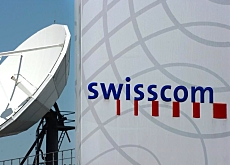
Swisscom privatisation given one last chance

A Senate sub-committee says it wants to keep alive government plans to privatise Switzerland's leading telecoms group, Swisscom.
The committee announced its decision on Saturday, only ten days after the House of Representatives rejected any moves towards privatisation.
The committee’s recommendation was far from a ringing endorsement of the cabinet’s intention to sell its 62.45 per cent stake in Swisscom, which would boost the state’s coffers by up to SFr16 billion ($13.12 billion).
Members of the transport and telecommunications committee voted in favour by the slimmest of margins, 7-6, to allow the government to pursue its policy.
And it called on the government to scale back its plans for an unconditional privatisation, expressing fears that possible foreign owners would neglect the home market.
The committee said if finally approved by parliament, the cabinet would still have to go back to the drawing board to include measures safeguarding services to peripheral regions.
It also said the government should reconsider a partial privatisation enabling the state to maintain a controlling share of its Swiss network.
It is uncertain how the Senate will vote when it tackles Swisscom’s privatisation next month. Members of the centre-right Christian Democrats and centre-left Social Democrats hold a small majority in the chamber, and it was their colleagues who led the opposition to the government plans in the House of Representatives.
And the Senate sub-committee for security issues has already recommended a no vote, saying the cabinet has failed to take into account the potential consequences of Swisscom’s privatisation for the armed forces and national security.
Eircom
The government decided to offload its shares last November after it blocked Swisscom’s planned takeover of Ireland’s Eircom and banned the former state monopoly from foreign acquisitions.
Supporters of the government proposal have said it is too much of a risk to let the state continue to be Swisscom’s main shareholder, citing the collapse of the former national carrier Swissair as the perfect example of what could go wrong with state shareholdings.
Members of the centre-right Radicals and rightwing Swiss People’s Party, who make up a majority on the transport and telecommunications sub-committee, argued that Swisscom needed to be privatised to compete effectively with other operators.
Swisscom’s management backs the privatisation plan, with the government selling off its entire stake being its preferred option. The company believes foreign expansion is the only way for it to survive in the longer term.
swissinfo with agencies
Swisscom’s net profit in the first quarter of 2006 was SFr460 million ($377.1 million).
This was 11.5 per cent less than for the comparable period in 2005. Turnover was SFr2.375 billion, down 2.9 per cent.
Chronology:
November 2005: Cabinet announces its intention to sell its majority stake in Swisscom.
May 10, 2006: House of Representatives rejects privatisation.
June 7, 2006: The Senate due to vote on the issue.
A no vote in the Senate will bury the proposal. “Yes” will send it back to the House of Representatives.
If in the end, parliament backs the cabinet plan, the left including the Social Democrats have threatened to launch a referendum in order to call a nationwide vote to let the Swiss have the final word.

In compliance with the JTI standards
More: SWI swissinfo.ch certified by the Journalism Trust Initiative



























You can find an overview of ongoing debates with our journalists here . Please join us!
If you want to start a conversation about a topic raised in this article or want to report factual errors, email us at english@swissinfo.ch.